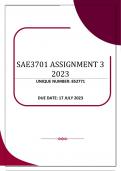SAE3701 ASSIGNMENT 3
2023
UNIQUE NUMBER: 852771
DUE DATE: 17 JULY 2023
,ASSIGNMENT 3
UNIQUE NUMBER: 852771
CLOSING DATE: 17 JULY 2023
MARKS: 100
QUESTION 1
THE PROBLEM
There is evidence that teachers do not behave professionally in South African schools. The
issues range from absenteeism, to not honouring teaching periods etc.
As a principal, you are advised to develop a strategy to instil values of accountability and
professionalism in the teachers at your school.
Use the following guidelines when writing your essay:
1. Provide a heading for your essay. (3)
2. Write an introduction. (5)
3. Discuss the different types of unprofessional behaviour experienced in schools. (5)
4. Lay out your strategy to help teachers be accountable and act professionally. (10)
5. Conclusion (5)
6. Bibliography (2)
Please note the following:
• Your essay must not exceed 6 (six) typed pages.
• Please acknowledge the sources of your information.
• Do not copy directly from the sources – paraphrase.
• Provide your essay with a bibliography.
• The bibliography must be in alphabetical order, for example:
Higgs, P & Smith, J. 2016. Philosophy of education today: An introduction. Cape Town:
Juta.
Mkhabela, Q & Luthuli, C. 1997. Towards an African philosophy of education. Pretoria.
1
, Fostering Accountability and Professionalism in South African School Teachers
Introduction:
In South African schools, the issue of unprofessional behavior among teachers has become a
pressing concern. Instances of absenteeism, failure to honor teaching periods, and other
forms of unprofessional conduct have been observed, impacting the quality of education
and overall school environment. As a principal, it is crucial to develop a strategy that instills
values of accountability and professionalism in teachers. This essay aims to explore the
various types of unprofessional behavior in schools, followed by the presentation of a
comprehensive strategy to address these issues.
Types of Unprofessional Behaviours Experienced in Schools:
In South African schools, unprofessional behaviours among teachers can manifest in various
ways, negatively impacting the learning environment and students' educational experiences.
The following are some of the different types of unprofessional behaviours experienced in
schools:
Firstly, Absenteeism - Teachers frequently being absent from their assigned classes without
valid reasons or proper notification can disrupt the continuity of learning (Higgs & Smith,
2016). Absenteeism hampers students' progress and causes frustration among both
students and parents.
Secondly, Failure to Honor Teaching Periods - Teachers not adhering to the allocated time
for lessons, arriving late, or ending classes early can disrupt the school's schedule. This
behavior affects the overall discipline and structure of the school and may result in students
missing out on important learning opportunities.
Additionally, Failure to Prepare and Plan - Teachers who are inadequately prepared for
their lessons can lead to disorganized and ineffective classroom sessions. This behavior
diminishes students' confidence in their teachers' abilities and reduces their motivation to
learn.
Thirdly, Neglecting Teaching Responsibilities - Some teachers may neglect their
responsibilities by not adequately preparing for lessons, not covering the syllabus
comprehensively, or failing to provide timely feedback on assignments and assessments.
This behavior hinders students' academic progress and compromises the quality of
education they receive.
Fourthly, Inappropriate Behavior - Instances of inappropriate behavior, such as using
disrespectful language towards students or colleagues, can create a hostile and
unprofessional atmosphere. This behavior negatively impacts the overall school culture and
undermines mutual respect and trust within the school community (Higgs & Smith, 2016).
2




